We've seen Keira Knightley playing so many dour,
serious roles in so many period pieces that it can sometimes be easy to
forget that she is just a normal, young, friendly actress. However, if
you sit with her, like I did recently in New York's Waldorf-Astoria
Hotel, her clothes casual and modern and an impish smile playing around
her face and dancing eyes, any preconceptions you may have taken from
her movie roles quickly disappear.
We've watched Keira Knightley growing up, so
sometimes it feels like we know her. A child actress who first caught
our attention in Star Wars: The Phantom Menace and Bend it
Like Beckham, Knightley became a star when taking on the role of
Elizabeth Swann in the Pirates of the Caribbean series. Since
then she has been able to juggle art-house hits (getting an Oscar
nomination for Pride and Prejudice as well as acclaim for
Atonement), big budget, commercial films (The Pirates movies,
Domino, King Arthur, Love Actually) and quirky independent
features (A Dangerous Method, London Boulevard).
Knightley's latest role is in the bittersweet
romantic comedy Seeking a Friend for the End of the World, in
which two lost souls find each other in the final weeks of life on
Earth. The film was directed by first-timer Lorene Scafaria
(screenwriter of Nick & Nora's Infinite Playlist). It co-stars
Knightley with Steve Carell as Penny and Dodge, two neighbors who never
really met until it is announced that the world will be ending in three
weeks. While trying to get their lives in some kind of order for the
end, they end up growing closer as their time quickly ticks away.
Later this year, Knightley will be reteaming with
director Joe Wright, who directed her in Pride and Prejudice and
Atonement, for a new version of Leo Tolstoy's classic book
Anna Karenina.
A couple of weeks before Seeking a Friend
opens across the country, we sat down with Knightley to discuss her
career and the films.
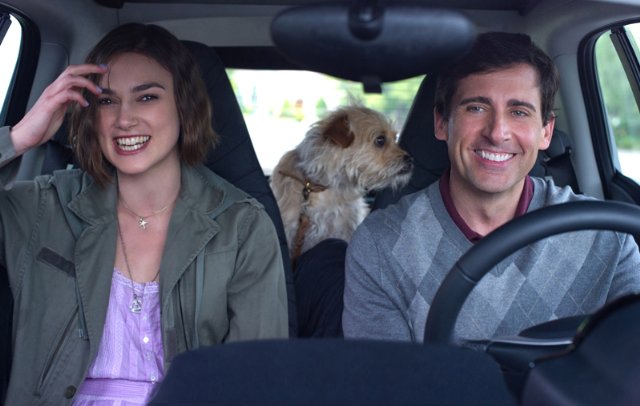 Would
you consider this a comedy about the end of the world?
Would
you consider this a comedy about the end of the world?
No, I'd say it has comic moments. I wouldn't call
it a comedy, but I can't find one of those nice phrases that it fits
into. People have said dramedy. I don't know. Romantic... it's not
really a romantic comedy. I can't really find the correct one.
What did you think
about Penny?
I just really liked her. I loved the script. I'd
never read anything like it. I love the idea of taking this subject
matter that is sort of as death, doom and destruction as you could
possibly get, and then putting this other twist on it. It's kind of, I
suppose, comic, but also just making it incredibly personal and very
small. You see a film about the end of the world and you think it's
going to be an action blockbuster and there are going to be heroes. I
love the idea that you take people from a suburban place who can't quite
figure out what to do with themselves. They're still having the same
problems as they've been having for their entire life. Just trying to
deal with that. I loved all of that.
So you didn't expect
Michael Bay to be the director...?
No, I definitely didn't. (laughs)
Do you ever think
about the end of the world and what you would do if you were in their
position?
No. I hope that I wouldn't know about it. I
wouldn't want to know. Ignorance is bliss. If anyone said, "You've got
20 days to go," I'd just be in the corner, crying. I'd be terrified.
So, no, I haven't...
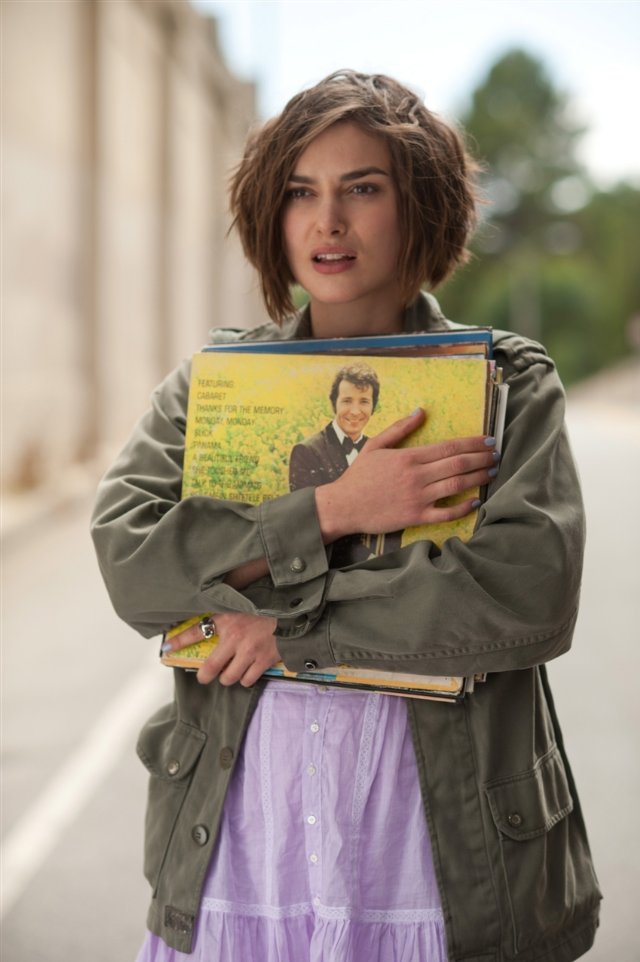 I
thought it was interesting that Penny carried around all of her old
vinyl LPs everywhere. That was the one item she wanted to save.
I
thought it was interesting that Penny carried around all of her old
vinyl LPs everywhere. That was the one item she wanted to save.
Yeah. I know.
If you were in that
position, what do you think you'd be sure to save and keep close?
The thing about those albums was, she was dragging
around the albums, but she wasn't dragging around anything to play them
on. I personally would find that really annoying. I would probably
just get as many bottles of alcohol as possible. I wouldn't want to be
sober if it was the end of the world. That would be horrendous. So,
wine, and a lot of it.
Do you think the
albums were like a teddy bear or something, just something for her to
clutch?
I think they were how she could make sense of the
world. They were the things that she... I think, like so many music
lovers, they become such a personal [thing]. Memories are completely
tied up with music, so people and times of her life would have been
completely tied up to those things. She was almost carrying around her
life with her, in a way.
Would you have any
records you'd want?
You know, I don't really have the same thing. I
like music. I'm not a music lover. It's weird, because a lot of my
close friends and family mates and members are totally obsessed by
music. I've always, for some reason, been attracted by people who are.
I suppose in the way you are attracted by any enthusiast of anything. I
don't have that. It's always been a quiet mystery. I really like it.
I can listen to it. But I could equally sit there and it be silent and
I wouldn't miss it.
You don't have any
songs that make you nostalgic?
No, I don't. I literally... it's really weird, I
remember it so clearly, I didn't like music [as a child]. I actively
didn't listen to it throughout my teenaged years. I remember being
like 11 and my best friends at that time were suddenly getting into
music, and me still wanting to play. Suddenly, I was meant to be
listening to boy bands, and I found it really offensive. I thought it
was the boy bands' fault. So I didn't listen to it, literally, until I
got into my early, mid-20s. Then I suddenly went, "Oh, hey, this is
great. I get it."
You're marrying a
musician.
(It had just been
announced that she was engaged to keyboard player James Righton of the
Klaxons a week earlier).
I know. (laughs) I think that's why.
Congratulations, by
the way.
Thank you.
That's a gorgeous
engagement ring.
It is lovely. (Shows it.) He did very well.
Was that a big step
to take the plunge?
(laughs)
When have you ever known me to talk about personal facts?
I'm wearing the ring. That's as close as I can get to talking about
personal facts. I can't actually talk about it. (laughs again)
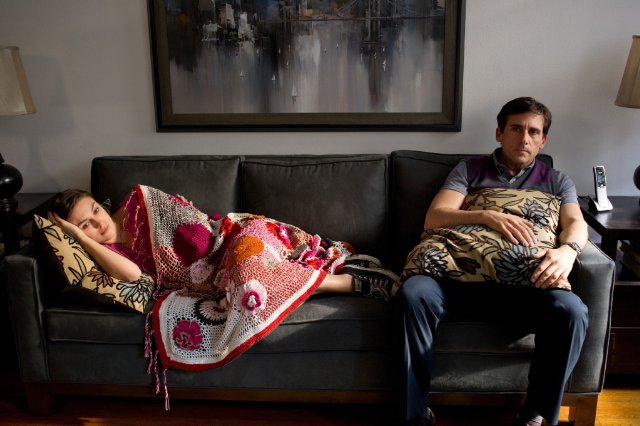 Steve
is known more for his comic work, and you are known more for your
dramatic roles. I thought it was an interesting pairing. How was he to
work with?
Steve
is known more for his comic work, and you are known more for your
dramatic roles. I thought it was an interesting pairing. How was he to
work with?
Lovely. He's just a wonderful man. You meet people
in every walk of life. He is just one of the world's brilliant people.
He's so giving and generous – giving and generous are the same thing,
but you know – he's supportive and funny. He's very quiet. You meet a
lot of comics and they are very in-your-face, it's one joke after
another. It's almost like a defense mechanism. He's completely the
opposite of that. He makes everybody around him feel like they are
funny, which is a gift, I think. I don't have enough good things to say
about him.
Did his performance
affect yours, draw out the comic side of you?
Yeah, his performance affected mine, because they
always should. It's sort of about bouncing off of each other. He is
absolutely extraordinary, because I don't think he plays Dodge for
comedy. I think there was a way he could have played it where it would
have been much more comedic. He chose not to do that. But, you'd find
him finding the weirdest, most amazing comic beats within it. I'd watch
him going: I'd never even think of [that]... Something physical. He'd
always just be able to sprinkle in whatever he wanted. It was amazing
to watch.
You just reteamed
with [director] Joe Wright for the third time, to play
Anna Karenina.
You've had two extraordinary films with him already [Pride and
Prejudice and Atonement]. How much pressure does that put on
you to keep up?
It's really weird. The first time we worked
together, everybody was like, "He's a TV director and she's shit, so
it'll probably be shit" They really did. It was quite nice, because
there wasn't any pressure, though equally we were going, "God, people
are really down on it." The second time, it was the unfilmable novel,
so again everybody was going "It's going to be crap. They were just
lucky on the first one. Nobody is going to make that." Then it worked
out. This time everyone is like, "Oh, no, it's going to be good" and
we're like (slams her hand on table) "Shit!" So, I think I like
the other two more than I like this one. I don't know. He's gone for a
really, really ambitious, very theatrical take on it. I love what he's
chosen to do. It's not in any way a classic telling of the story. It's
right out there. I think we both are like: if you're going to go down,
go down in flames. I really hope it works. I think it will. I've seen
stuff and I think it looks amazing.
Do you mean like
operatic tragedy, going to the heights...?
Not necessarily the performance that is the
theatrical side of it. I think actually that's not. I think it's more
the way the whole thing is done. The trailer will be out this week, so
you'll see kind of what I mean. I can't actually quite describe it
yet. You're going to have to see some of it. It's more the setting.
It's not a naturalistic setting. It's a theatrical one.
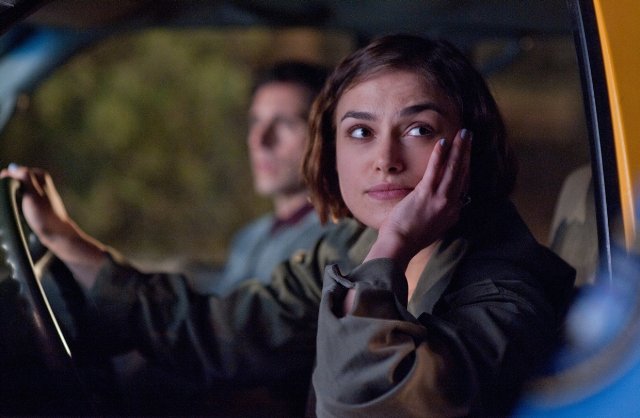 Back
to this film, one of its many strengths is its sense of humanity. How
do you feel the advancement of modern technology is affecting the
quality of human relationships, whether they are love or friends?
Back
to this film, one of its many strengths is its sense of humanity. How
do you feel the advancement of modern technology is affecting the
quality of human relationships, whether they are love or friends?
I don't know. I don't really do any of that. I
suppose I don't do it because I don't feel that comfortable with it. I
like the idea that if you are going to say something shitty about
somebody, say it to their face or don't say it at all. I think it
allows a disconnect with humanity, which I find quite frightening. I
think it also means that people can get very confused between the
difference between information and knowledge. It gives a lot of
information. I don' t think you can get that much knowledge. Saying
that, the connection and the ability for people to put work out there
and for young filmmakers, young musicians, young writers to be able to
have a forum where they don't have to go through the traditional
methods, is completely amazing. Getting out there and being able to
tell a whole world of people about that is completely amazing. I think
the other side of it is so vicious, but I don't know that isn't
actually what we are like. I think it's quite honest to what human
beings are. There is an interesting part where the social norms are
suddenly taken away and you really see humanity. It's a quite
frightening picture. But I don't know if that frightening picture is a
bad thing.
Why didn't your play
The
Children's Hour, this huge hit in London, come to Broadway?
We couldn't get the schedules to work. It might do
at some point, but we couldn't get everybody together at the same time.
So New York is never
going to see you on stage?
I think it will see me on stage, just maybe not in
that one. (laughs) But, maybe. Who knows?
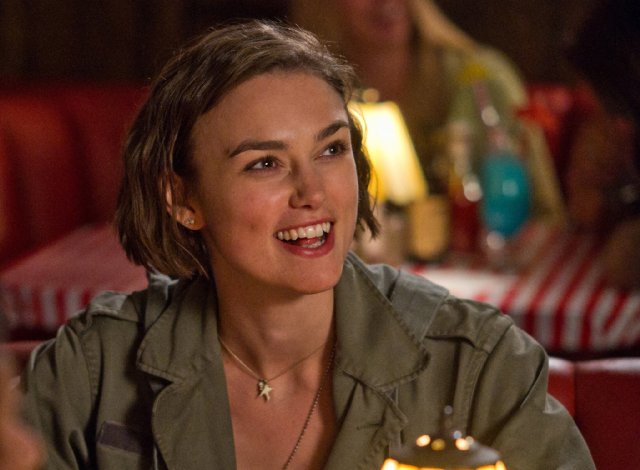 What
do you get from theater that you don't get from film?
What
do you get from theater that you don't get from film?
It's more of an active medium. Film is a director's
medium. You put together a performance and it's kind of out of your
hands. You can prepare it, you can go "this is what it is," but
ultimately, you're going to have done it normally at least seven or
eight different ways, from four or five different angles. Once it gets
into the editing room, it is somebody else fitting it together. Either
you've got them that he is really on the same line as you were, in which
case it comes together and it's really great, or you've got somebody who
doesn't quite get what you were doing or thinks they should have done it
some other way. In which case, it's [not so good]. Film, when it
works, is such a fucking miracle. It takes so many people being on the
same page to get out of that. Theater, if something is not working in a
night, you can kind of fix it. You can feel when the audience is going
with you. You're telling the story every single night. You're getting
the arc of it every single night. You can feel when people are with
you. You can feel when they are losing interest. You can move. It's
very exciting in that way. Film is always a guessing game. You don't
have the audience there, so you're always trying to see (whispers)
did that really work?
You have worked with
so many well-respected directors. This is Lorene [Scafaria]'s first
directing job. What was she like?
She's great. She was amazingly decisive. I think
that's what's incredible about Lorene. How confident (she was). You
wouldn't have thought she that was a first-time director. The first
day, we were all kind of going, "Okay, she's never been on set. How's
it going to go?" She was completely straight and telling you what she
wanted. People were like, "Do you want it a bit different?" "Do you
want it like this?" "Nope! That's it. Exactly like that." Okay.
She knew the tone she
wanted?
Yeah, yeah, completely. Which was amazing.
Do you think that was
because she wrote it?
I think that... yes, that had a lot to do with it.
She was obviously very active in the casting. She knew who she wanted.
She hadn't written it with people in mind and had a very strong view of
who those people should be. I think she got pretty much everyone she
wanted. So I have to say that was probably steering it. But, yeah, I
have to say, she wrote it, so she heard it, saw it and then filmed it.
It was her complete vision.
Other than Steve,
there are a lot of great talents in the supporting cast. Anyone you
were particularly excited to work with?
I mean, Martin Sheen. (laughs) That was
pretty amazing. Yeah, I'd say Martin Sheen was well up there.
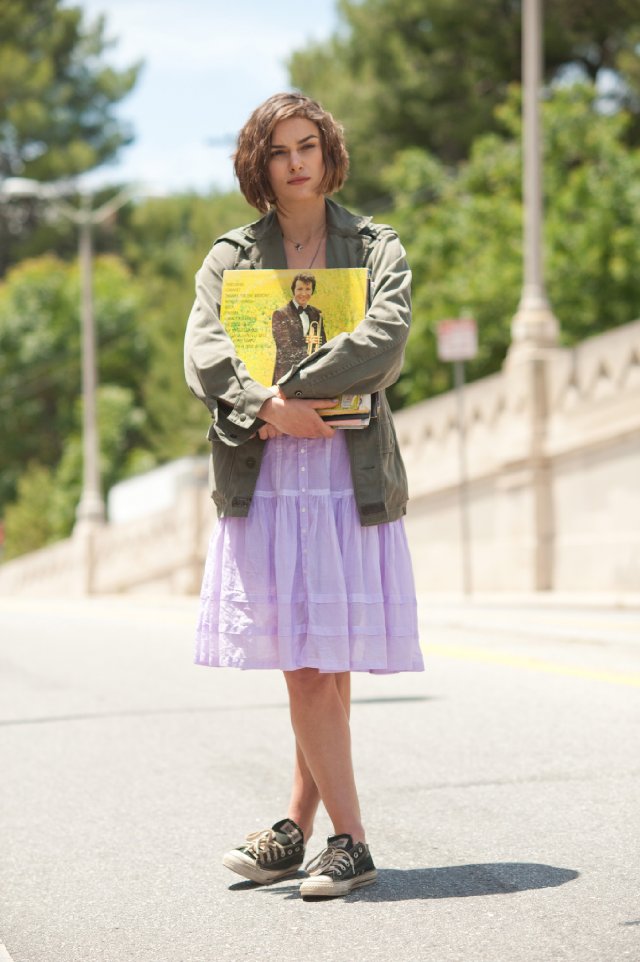 Who
came up with Penny's wardrobe?
Who
came up with Penny's wardrobe?
Again, it was Lorene. [She] had a really [strong]
vision. Like, that dress. That lavender. She was completely, it's got
to be lavender. My thing was the military jacket. And it had to have a
hood. And she was definitely the lavender dress. It was a
combination. It's lovely when you have a character who is slightly off
the wall and kind of slightly on a different planet. It wouldn't work
if the clothes were too done. It had to be something that was thrown
together and a bit mismatching.
Given the emotional
intensity of your role and the situation, how did you shake off from
that? How did you cleanse yourself from it?
I didn't find you needed to cleanse yourself of her,
because she was so positive. (laughs) As much as she could kind
of does think, "God. the world is ending," understandably, I think the
essence of what is in the character is incredibly positive. It was
somebody who, as much as she is going to go through the trials and
tribulations of life, she is always going to be able to pick herself up
and go, "My God, this sandwich tastes amazing." She's one of those
people. It was just really nice playing her. You go through the
emotional scenes, and well it's what I do for a living, but actually you
would always come back to somebody who was lovely. Whereas, you can
play other characters where you don't have that. Anna [Karenina], you
take her home at the end of the day and that's quite a grueling thing.
(chuckles)
Does any of that come
from you? Does Penny reflect your priorities?
She's more positive than I am. I'd love to be as
positive as Penny. I'm striving to be as positive as Penny.
Do people ever have
to convince you to play a role that you feel is wrong for you?
No. Generally, if I think I'm not right for it,
then I won't meet them. I don't want to waste people's time. I think
everything I do, it's pretty much as soon as I've read it, I go, "Yes,
that's the one."
At what point reading
this script do you know if it is a character you have to play?
I normally wait until I get to the end. (laughs)
I don't think I ever read a script and go through it and it'll be
like the second scene and I go, "Oh, no, this is definitely it." It's
always how the whole thing just washes over me. This one, as soon as I
got to the end of it, I signed up immediately and said, "Yes, get me on
the phone with her. I think this is just great." So, I said yes on the
phone to Lorene I think that afternoon or something.
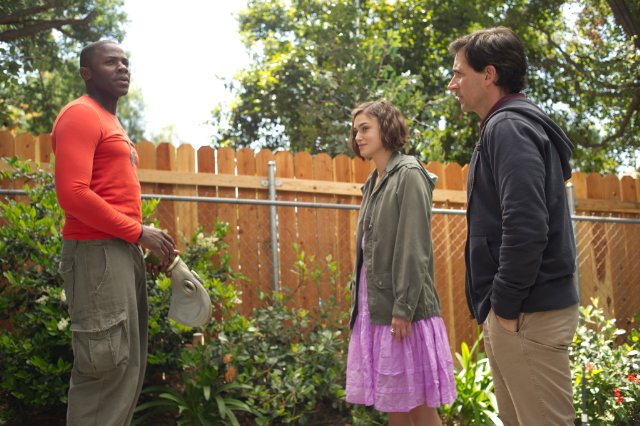 So
you don't count your lines?
So
you don't count your lines?
No, I don't. (laughs) I don't do any of
that.
Your bio mentions
your charity work. I was interested in how you got involved with
children with Spinal Muscular Atrophy.
Oh, my great friend Thea [Sharrock], who directed me
in The Misanthrope (Knightley's West End stage debut in 2009),
her nephew has it, so she asked me to be a patron of the charity
that her brother started. I said of course. I've done very little for
them, unfortunately. They haven't asked me to do very much yet.
(laughs) But yes, that is that one.
But your name helps
them.
My name hopefully helps. I went to a dinner with
her and they got a lot of money from that, so that's very good, you
know? So far that's all they've asked me to do.
Do you think that is
the best trade off with your celebrity? We often hear loss of privacy,
you're chased around the street. Is this a way to use it for something
with an upside?
Yeah. I think you have to be very careful that you
don't use it too much. People get very... they see too much of people
and they actually stop going, "I should give to that." But I think it's
that with any charity. Everybody would give. Everybody would try to do
something that would help somebody else, you know? If somebody turns
to me and says, "Can you please come to this dinner?" Yes, of course.
If that will help. I don't know if it always will. But, yes.
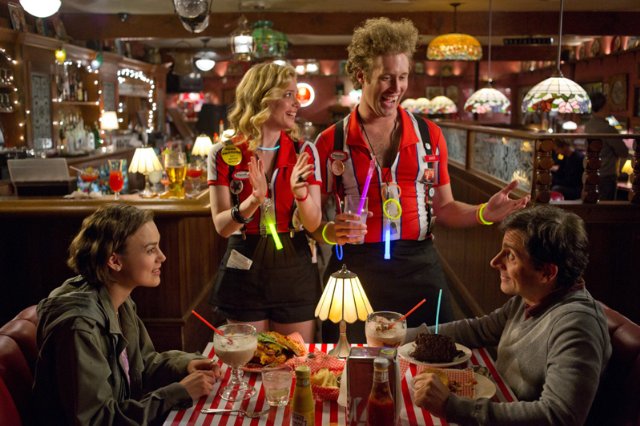 The
role in this film is unusual for what we've seen of you. Did it feel
unusual to you, getting into the character?
The
role in this film is unusual for what we've seen of you. Did it feel
unusual to you, getting into the character?
Yes and no. Yes, it did, I've been doing a lot of
tragic stuff. I'd just finished Children's Hour, which was
onstage, every single night, my best friend is blowing her brains out.
For four months, that was pretty testing. I really did want to play
something that was not like that. There is a sense of it being like a
palette cleanser, which I have to say I'm doing with the next
one, as well. Playing Anna Karenina, I just got to the end and
was like, I can't. Actually, I got offered a film with somebody really
great, but it was so dark. I said, "Normally I'd say yes to this, but
actually I can't face doing another one." So, I'm going to go off and
do something nice and positive, which is something called Can a Song
Save Your Life? with Mark Ruffalo. It's something very different
for me, again, but it's something that is rather joyous.
Is it about a radio
program?
No. It's about a washed-up A&R man and a
singer-songwriter trying to make an album together. It's just very
joyous and I would like that, yes, please, right now. (laughs)
Let's put something positive out there, not all this doom and gloom.
Do you ever think
you'd want to direct a movie, yourself?
I don't know. Yes and no. The directors I've
worked with who I've really, really loved and really respect have given
absolutely everything for those films. I'm not quite sure that I'm
willing to do that. And I wouldn't want to direct unless I would be
willing to do that. So if there is a point in my life where I went,
"This is a story meant to be. I could give up a good year and a half
[for it]." Then, yes. But, unless I was willing to give that, I
wouldn't.
Is being engaged
changing your enthusiasm to work?
I think that would change naturally anyway. When
you first become successful, you obviously want to take every single
opportunity and you want to do as much as you can. Then later you
realize that whole life/work balance was really... there was very little
life and a hell of a lot of work. I think there is always a point in
your life where you go, "Oh, I want to redress that and want to make
sure I do spend the time with the people I love." That definitely means
that you don't have your foot all the way down on the accelerator of the
career, but I really love movies and I really want to make really
excellent movies. I think my work improves when I have life experience
and when I don't go job to job to job. When I actually take a step back
and then come back to it. Then I'm the person I want to be on the set,
which is a positive person, and not a person that is too tired. That's
very important to me.
CLICK HERE TO SEE WHAT
SEEKING A FRIEND... CO-STAR STEVE CARELL HAD TO SAY TO US!
CLICK HERE TO SEE WHAT KEIRA KNIGHTLEY HAD TO
SAY TO US IN 2006!
CLICK HERE TO SEE WHAT KEIRA KNIGHTLEY HAD
TO SAY TO US IN 2007!